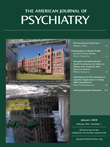Drs. Volkow and O’Brien Reply
To The Editor: Thank you for the opportunity to respond to the thoughtful letter by Dr. Bruno. It reflects a misunderstanding of our editorial, and we welcome this chance to clarify our position.
Naming a body size a brain disorder was not our intent. Moreover, we do not subscribe to the concept that any individual who overeats and suffers from obesity would meet criteria for a neuropsychiatric disorder, just as the majority of individuals who abuse drugs do not meet criteria for drug addiction. The intent was to recognize those individuals in whom the drive to consume food is so overpowering that they cannot control these urges, despite the attempt to do so and the devastating consequences. In fact, one of the aims of our editorial was to recommend that the team working on DSM-V develop diagnostic criteria to help identify the cases for whom the obesity problem may have an underlying addictive component.
The editorial never claimed that the “urge to eat” was a brain disorder, but rather that the pathological disruption of the neurobiological substrates that underlie “the urge to eat” should be considered as a brain disorder.
We are also very sensitive to the stigma against obesity, which is in part a reflection of the belief that these individuals suffer from lack of self-control and if they simply decide to lose weight they would succeed in doing so. We do not doubt that there are programs that help people deal with their weight problems through behavioral interventions, just as there are behavioral interventions that help individuals deal with other behavioral disorders, including substance abuse. However, recognizing that the compulsive overeating patterns of individuals whose weight is jeopardizing their medical and psychological well being may reflect a disruption of brain circuits involved in compulsive behavior, inhibitory control, or conditioned responses should not add to their problems but rather help change the stigma by removing the mistaken belief that these individuals are in control of choosing their eating behaviors.
The dramatic increase in obesity is not a figment of the imagination of our society created to generate incomes through dieting regimes and exercising equipment, but a reality that is affecting the health of millions of individuals and is costing the health care system billions of dollars. We can continue doing things the way we have been or we can change the way we look at a problem and try to develop new strategies to help solve it.



